Don't wanna be here? Send us removal request.
Text
Santiago Things (the fandom doesn't talk about)
1.) He knew Louis and Claudia were lying from the very beginning.
Santiago: "Eglee here does star charts for us all. Night you were given the gift, phase of the moon, name of the maker?" Eglee: "I don't really need-." Santiago: "Do you both have the same maker?" -- 2x02
2.) He read one of Claudia's diaries right in front of her and then used them as evidence in The Trial. He was never her friend.
"We've no need to hear from you, [Claudia] we have your words here!" --2x07
3.) He clearly never got over the death of his maker, who was destroyed by Armand for breaking one rule. Louis and Claudia broke them all and Armand let them get away with it.
"My maker lies in the walls downstairs. Maitre put him there." -- 2x03
"Maitre has a gravely attachment to the laws. [...] Francis Naughton (Santiago) was transformed without the permission of the vampire Armand in absentminded violation of Law One. And here lies his daddy vamp." -- 20x4
4.) Bonus:
Armand: "A play is a map for production." Santiago: "Uh, no. A play is the script." -- 2x05

96 notes
·
View notes
Text
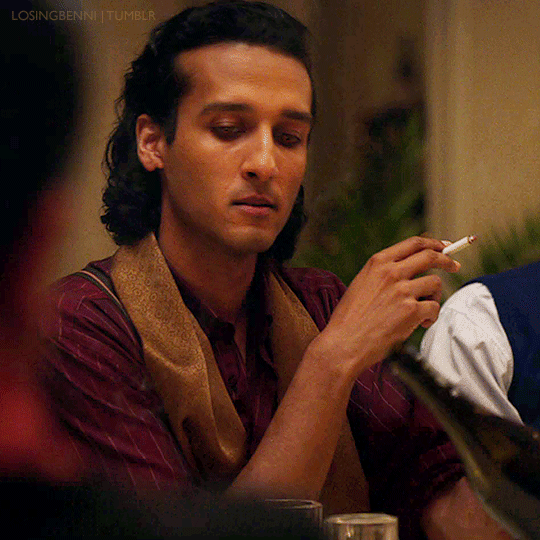
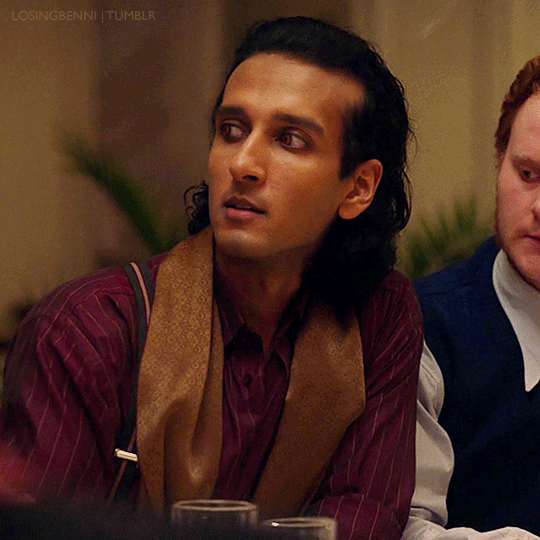
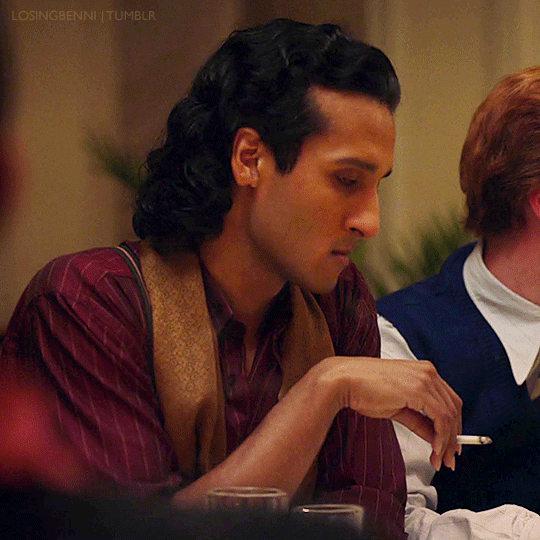
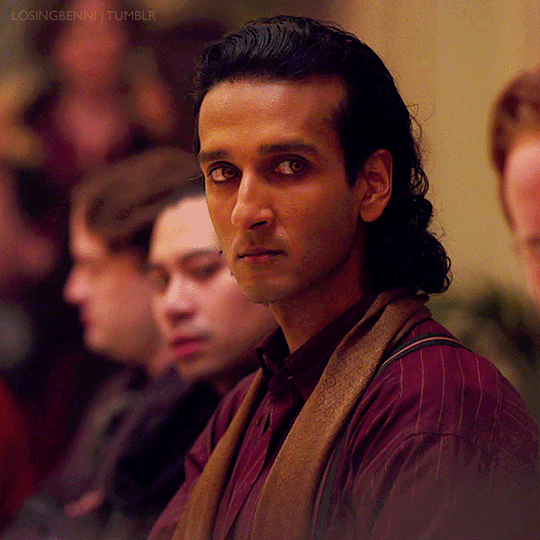
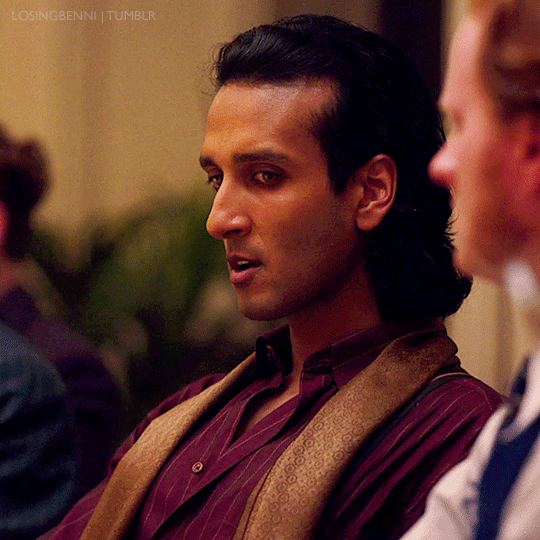
ASSAD ZAMAN as Armand
INTERVIEW WITH THE VAMPIRE (2024) 2.04 – I Want You More Than Anything in the World
967 notes
·
View notes
Text
re: cry to heaven (1982) by anne rice. I think it’s really fun that they reference it explicitly when they’re dealing with existentialist narratives with armand on the show (they also tossed sartre in there just in case we didn’t get what the show was explicitly trying to do with him), I like that beckett’s “waiting for godot” is styled “enduring for guido”:
a) ‘enduring’, see also: survival after constant upheaval - a theme that show touches on repeatedly
b) explicitly referencing one of the dual protagonists in cry to heaven whose storyline runs quite parallel to armand’s in ways that are very straightforward.
armand is so moved by this iteration of “waiting for godot” that he’s nearly moved to tears and regularly goes home to tell louis how much the play compels him despite having a pretty unconventional form compared to the theatre’s usual repertoire if santiago’s words are to be believed. and on top of that “enduring for guido” equates the titular godot (also “hope”, as the show clarifies) with an absent maker who shirks his responsibility and abandons his fledgling to the despair of his wretched existence, and wouldn’t armand have extremely personal feelings about that.
33 notes
·
View notes
Text
I’ve been thinking about why Armand tells Louis about his past. Right before the “Amadeo” scene, Louis calls Armand’s apology (the Romeo and Juliet scene, the flowers, the walk through the Louvre) “vintage Lioncourt,” as in, sweetness and apology and intimacy deployed at an opportune moment to generate sympathy after a show of power (knocking out the coven at the dinner table, dressing Claudia up in the “baby doll” dress as punishment). Armand tells Louis he’s not Lestat, Louis asks Armand who he is. Then Armand shows Louis the painting, The Adoration of the Shepherds With a Donor. Right before he tells Louis about his past, his voice starts to waver, he pauses, looks unsure, presses on. He didn’t have to tell Louis all that. If it was merely an apology, merely a play for sympathy and a calculated move to bond them as a couple, there wouldn’t have been a real need to tell Louis everything. He could’ve merely told Louis about how the coven came to Rome and burned Marius, could’ve merely told him about how he occasionally “donated,” could’ve told him the tiniest fragment and it would’ve been enough to garner whatever sympathy or forgiveness Louis thinks he wants. Instead Armand tells him everything. The ship captain, the brothel, how the abuse was so bad he can’t even remember his name, how Marius saved him, how he worshipped Marius, how Marius still trafficked him, how the coven burned Marius and kidnapped him and sent him to Paris. It elicits obvious sympathy and compassion in Louis; the ploy has worked. But it’s not really a ploy, it’s Armand asking Louis to paint him. He’s asking for recognition. He’s saying I don’t know who I am, but this is why I don’t know who I am, and I need you to tell me who to be. (“Who am I, Louis? Am I my history I have endured? Am I the job I do not want? No one has painted me in over 400 years.”) The last time someone painted him he was a donation. Currency, an object, a belonging. Then he was a leader, trapped in a job he didn’t want, then Lestat liberated and destroyed him, and gave him a new job. No one has painted him in over 400 years. Who is he now? Is he Lestat’s replacement? Is he Lestat’s antithesis? Is he the subject or the distraction? Would Louis have him? It’s clear that both of them decide on something when Louis calls Armand “Arun,” and Armand calls Louis “maitre” in return, and it’s in that moment both of them have painted each other into roles they’ll grow to resent. But I really do think that the little museum tour they went on, while clearly an apology, but also a move towards commitment, was also Armand asking Louis to paint him, point blank. Tell him who to be. Decide and he’ll be that person. He’ll be whatever Louis paints. He’ll be whatever Louis photographs. He’ll be what Louis decides. In some ways it’s the grandest of all romantic gestures. In many others it’s disturbing enough that it probably prompted the beginnings of psychiatric science as we know it today. But still romantic. Romance, wrapped up with power and control and the most domineering submission you’ve ever seen. But the photo Louis actually takes of Armand — the closest he gets to making literal the painting — isn’t actually of Armand. It’s of the dream of Lestat. Yet it’s this photo that finally allows Louis to dismiss the dream, so that he and Armand can paint each other properly, and make demands of each other they’ll both grow to resent. Painting each other and trapping each other in the same strokes. Funny they collect art.

1K notes
·
View notes
Text
Skip Google for Research
As Google has worked to overtake the internet, its search algorithm has not just gotten worse. It has been designed to prioritize advertisers and popular pages often times excluding pages and content that better matches your search terms
As a writer in need of information for my stories, I find this unacceptable. As a proponent of availability of information so the populace can actually educate itself, it is unforgivable.
Below is a concise list of useful research sites compiled by Edward Clark over on Facebook. I was familiar with some, but not all of these.
⁂
Google is so powerful that it “hides” other search systems from us. We just don’t know the existence of most of them. Meanwhile, there are still a huge number of excellent searchers in the world who specialize in books, science, other smart information. Keep a list of sites you never heard of.
www.refseek.com - Academic Resource Search. More than a billion sources: encyclopedia, monographies, magazines.
www.worldcat.org - a search for the contents of 20 thousand worldwide libraries. Find out where lies the nearest rare book you need.
https://link.springer.com - access to more than 10 million scientific documents: books, articles, research protocols.
www.bioline.org.br is a library of scientific bioscience journals published in developing countries.
http://repec.org - volunteers from 102 countries have collected almost 4 million publications on economics and related science.
www.science.gov is an American state search engine on 2200+ scientific sites. More than 200 million articles are indexed.
www.pdfdrive.com is the largest website for free download of books in PDF format. Claiming over 225 million names.
www.base-search.net is one of the most powerful researches on academic studies texts. More than 100 million scientific documents, 70% of them are free
303K notes
·
View notes
Text


👏🏾Education 👏🏾is 👏🏾a 👏🏾right,👏🏾 not👏🏾 a👏🏾 service 👏🏾
Pass along and use the shit out of them
244K notes
·
View notes
Text
call me ignorant but i genuinely don’t understand why sports have to be split up by gender.
495K notes
·
View notes
Text
thought about when Daniel first sees Armand today and LBF makes sure he performs a FULL body reaction 🚬🚬🚬 mad lad thank you for your service

913 notes
·
View notes
Text

@ whoever is styling armand next season. for your consideration
(the lace is from this 17th century venetian needlepoint that i found by chance while looking for public domain patterns)
1K notes
·
View notes
Text



ASSAD ZAMAN as Armand
INTERVIEW WITH THE VAMPIRE (2024) 2.06 – Like the Light by Which God Made the World Before He Made Light
642 notes
·
View notes
Text
At the back of my copy of The Vampire Armand, there's an old interview with Anne Rice talking about creating that novel. I've never forgotten her answer to one of the questions... It haunted me for years.
It gives incredible insight into how and why she wrote such beautiful, brutal and broken characters, and what she endured in the creation process.
BUT before you read this, I'm going to STRONGLY warn you, it goes to very very DARK places
Q: What are your work habits for a novel?
A: Once I truly begin to write, I work obsessively, in twelve-hour days, punctuated by days of long sleep and vivid dreaming. Starting time and ending time are no longer important. I might begin at 9 A.M., or after noon or at eight in the evening. I go from there. I turn on the computer and write, write, write.
My room is a mess. Notes are scribbled on the walls so that I can look up at them at the appropriate moments and insert the date, the name, whatever, when I need it. Books are stacked so high that people have to search for me when they come into the room. Opened books with marked-up pages are stacked on top of one another.
I become suicidal. I go through a horrid despair some time or other before the final page, during which everything seems meaningless—from the dawn of history to the very hour in which I am writing.
I’m intolerable to live with. But I spread myself thin over a number of loved ones and staff members so that no one person has to put up with how intense, hysterical, and miserable I am.
When I get elated and talk fast and furiously about wonderful aspects of history or the characters, or good developments in the story, people run away from me. I don’t blame them.
While the novel is being written, I try to avoid dressing for outdoors. No one can make you go out if you don’t have shoes on. Not even in the south. I wear long velvet robes and soft velvet slippers. I refuse to go out. All food is brought in. I eat hamburgers because they are easy to hold with one hand while reading and holding the book with the other hand.
In the middle of the night I read, sometimes on the carpeted floor of the bathroom, just because it’s warm. I am wretched. I don’t care anymore about being abnormal. Writing is everything. Everything. It seems impossible to write the book. It seems impossible to lift a hairbrush to brush my hair. But I do it. I put on mascara every day that I write.
This period of intense work lasts about six weeks. It’s best that way. My imagination is overheated, and my memory clogged with data of varying importance. If I go over six weeks, I begin to forget things; I feel the loss of intensity and information and I become all the more self-destructive and obsessed.
The end of the book is a big event for me. A big event. I start screaming. I put the hour and the date at the end of the last page. I expect everybody to understand, at least a little. It’s a triumph! The darkness of destiny has been driven back for a brief while. I celebrate. I scream, eat chocolate, and sleep.
Right near the end of writing The Vampire Armand, I realized I had to return to Italy, especially to Florence, and at once I began to make preparations for the trip. As soon as the novel was finished and off to the publisher’s, as soon as it could be accomplished, I flew to Italy. That gave me hope, a way out of a life threatening darkness that often follows the climax of a book. But I still ate chocolate and screamed.
While writing, I don’t want to rest. I don’t want to sleep. Why sleep? It seems stupid, except when weariness overcomes me like a giant cloud of poisonous vapor. Then I sleep fifteen to twenty hours. I tell people to go in and out of the bedroom and ignore me lying there, as if I were dead. I won’t talk on the phone. I won’t open my eyes if I don’t have to. I dream terrible, upsetting dreams.
I want to kill myself. But I can’t. I can’t do it to other people, and I have work that must be done, novels that must be written. So I don’t kill myself. Besides, I don’t think it’s good to kill oneself. It’s a horrible idea. It has a horrible effect even on acquaintances.
I think a lot about people I loved who are dead. I think of how dead they are, year after year, ever more dead.
989 notes
·
View notes
Note
I hope it’s OK that I ask, how will your Loumand fic do the gaslighting stuffs ? Will there be a sad ending , or if it’s in a universe where Armand won’t do that so it has a happy ending !
Firstly, strictly in regards to the fanfic: we set out to write a fanfic that is earnest, optimistic, and invested in the importance of Louis and Armand's love for one another over the course of their long relationship. I don't know that I am able to categorize the ending, and overall tone, as sad or happy. It's a mixture.
Secondly, I don't want anyone to think it's not okay to ask stuff and I am thus choosing to assume the most good faith version of this question, where you really just want to know what's in store for the fic in regards to tone. However, I do want to say that waking up to this in my inbox bummed me out a lot. I think a friend put it well when I shared this and they agreed that it can read as "Will you address my specific headcanons in your fic? And if not, can I judge you for it?" There's a (probably unintended!) air of… policing how happy Louis/Armand fics are allowed to be and in what circumstances.
Thirdly, I'm going to hand it over to @marbleflan for a response to the idea of 'the gaslighting stuffs' being a necessary talking point to all Loumand fics:
Wow, ok buckle up yall this is gonna be long!
This is one of those asks that is just so hard to know where to begin. Let’s start with how Armand gaslighting is presented as an immutable fact of the show that we would have to rewrite or omit in order to write a story with a happy/optimistic ending. So first of all: what gaslighting?
Just as a reminder, gaslighting as a term comes from the film Gaslight and refers to subtle acts of denial of someone’s perceived reality in order to undermine their confidence in their own version of events. Crucially, gaslighting is a pattern of behavior, and relies on small acts of denial (in the film, the level of light thrown by the gas lamps, hence the title) that make possible larger assertions of one reality over another. So when and where exactly does Armand engage in this behavior? Point me to the places where this is happening because I haven’t seen it.
This kind of assertion that Armand is “gaslighting” or “manipulating” Louis is so pervasive in the fandom, to the point where it’s often presented as a fact of his character rather than one possible interpretation of his actions. My own interpretation is that Armand engages in a lot more self-deception than he does conscious manipulation: that is, when he lies to Louis, he really thinks he is justified by the circumstances, rather than misleading him for some ulterior purpose.
Armand lies to Louis canonically twice: 1) when he colludes with the cult to kidnap Louis and Claudia and put them on trial and 2) when he mischaracterizes his role in the trial as coerced and passive when in fact it was active. For me, the biggest factor in thinking Armand makes the choices he makes because he believes he has no other alternative is the delivery of the line “I could not have prevented it” about Claudia’s death. To me, this line is delivered not to Louis and not to Daniel, but to Armand himself—he’s reassuring himself that even if he made different choices the trial and its fallout were not preventable.
Given Armand’s backstory, this kind of makes sense. Although he is the most powerful vampire in the coven, his experiences have taught him that being the most powerful will not save you: his maker, after all, was even more powerful and ancient and was burned alive by the Children of Darkness. And Lestat’s disruption of Armand’s rule over the CoD likewise showed him that a persuasive and charismatic leader can overturn centuries of indoctrination. It isn’t that he literally couldn’t have prevented it—it’s that he believes he couldn’t prevent it.
The second lie, about the extent of his involvement, I think is really where there could be multiple interpretations. Why would he do this? My own take is that he does not go into the trial thinking Louis will survive. He fully expects that both Claudia and Louis will be killed and he’ll be left behind. Thus, he plays the role he always plays within the coven: artistic director. Later, after Lestat manages to intervene and transmute Louis’s sentence, he decides to free Louis. When Louis assumes Armand saved him at the trial, Armand doesn’t correct him and goes along with it, and the lie spirals from there.
To me, I can completely see Armand justifying these lies of omission in a variety of ways. Sure, he didn’t save him at the trial, but he did save him later (by freeing him from the coffin). Sure, he did betray him, but he thought he didn’t have a choice. What’s the difference between feeling like you don’t have a choice and being physically restrained? And so on, and so forth. My point is not that Armand is blameless, or that he should be absolved of responsibility for his choices, but rather to point out that his actions aren’t fundamentally manipulative. They’re in character for someone who has survived a lot of abuse and violence, and whose priority is their own continued survival.
Now let’s talk about the San Francisco episode. Louis recovers his memories and is shaken, upset, and resentful that Armand took them; Armand claims Louis requested he remove them. Is he lying? The show doesn’t actually tell us! It’s completely left up to the audience to decide! Despite the near ubiquity of the opinion that Armand is lying here, I think there’s plenty of reason to think Louis might have indeed asked Armand to wipe his memories.
Firstly, it’s weird that Armand would have chosen only this memory to wipe, but left Louis with so many unflattering memories of him completely intact. Why not erase the trial, or at least Armand’s betrayal? Armand, in Louis’s Paris memories, fights with him, fucks up in front of him, all sorts of things. If Armand’s goal is manipulating Louis (for what, I’m not even sure - just to stay in a relationship with him?) why erase only this one memory? And moreover, why not erase Daniel altogether? Daniel stays with Louis and Armand for five days and then Armand says he erased Louis’s memories three days after that. Armand can erase eight days of memory but not eight and a half?
Secondly, although Daniel makes a huge deal out of their memories cutting off at the same moment, to me this is more of a flag for the opposite. In Louis’s own recovered memories, he is an active participant in erasing Daniel’s memory: in fact, it is practically his idea! Armand is ready to drain Daniel, wrap him in plastic, and yeet him into the nearest incinerator, and Louis is the one who demands he live. Louis is the one seen feeding Daniel his rote lines. Louis’s own rote lines, which emphasize Daniel’s importance, make more sense for him to have authored than Armand, who at that point is pretty much ready to kill Daniel and be done with it.
I also think it’s in character for Louis to have asked for it. Louis, in season one in the confession scene, says explicitly that his problem is avoidance: he runs to the bottle, etc. In fact that’s exactly what we see him doing in 1973, escapism via drugs and sex. Louis’s desire for the truth but instinct to misremember is central to his whole character. Hence the emotional freight of him telling Daniel that Lestat’s version of Claudia’s turning was more accurate, it’s him confronting how even as he tried to reveal the truth to Daniel his instinct was to alter the details to make himself seem less culpable. He’s always struggling with this: how much of what happened is his fault? He’s afraid of the answer, because he feels responsible for it. Additionally, Louis has trauma specifically around suicide, because of Paul’s death. So yeah; I can see him at a low point in 1973 saying “I can’t live with myself, I don’t want to remember this.”
This is just my interpretation, but it’s as valid as any other, because the show does not give us the answer.
This is getting way too long and I have more to say BUT finally I’ll just ask that if you’re jumping on the “Armand is manipulating Louis” bandwagon please sit with yourself for a moment over why it’s that character that must be the manipulator. Why, in a show that takes great pains to have a full cast of flawed, realistic, imperfect characters, the one that is somehow irretrievably, Machiavellian-ly manipulative? What is it about him that inspires this reaction? 🧐🧐🧐🧐🧐 Maybe just sit with that question for a minute.
-
THANK YOU @marbleflan for all that. I'm going to be honest: I don't really have the emotional energy for further discussion of this, which is why I'm grateful my friend was willing to share her thoughts. If you disagree with this, that's your prerogative! But I'm not going to be answering any asks that seem to be judging/policing/starting drama over a wrong interpretation of the character or ship.
160 notes
·
View notes
Text




ASSAD ZAMAN as Armand
INTERVIEW WITH THE VAMPIRE (2024) 2.06 – Like the Light by Which God Made the World Before He Made Light
3K notes
·
View notes
Text
armand is never like confidently in control or self assured or aware at all of anything, he's just pretty good at pretending he is. He's a good leader in the sense that people looking to be led seek out a leader who seems like they know what they are doing, and Armand is good at giving the impression that he knows what he's doing, when rlly he's most often the mentally damaged vampire equivalent of a fish flopping around on land waiting for some big hands to toss him back in the ocean and show him were he belongs
239 notes
·
View notes
Text

This sketch was marinating since July. Its time has come.
6K notes
·
View notes
Text

Bug-eyed little freak whomst i love and hate and love and hate an-
1K notes
·
View notes
Text


More of my favourite gaslighter, 40s version <3
3K notes
·
View notes